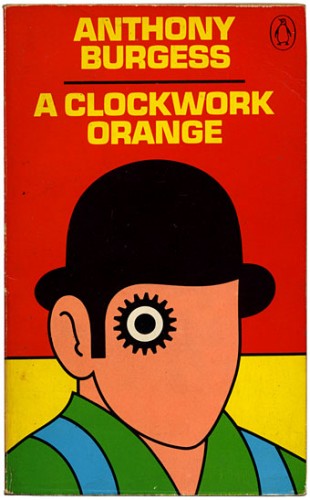 In our two books, A Clockwork Orange and 1984, the idea of Innocence and Experience is present. As you read this week, think about how our characters see the world. How are they innocent--naive, young, unknowing? We all go through the world with blinders on and then something happens that those blinders are removed. In this removal of the blinders, we come to see the world, the people, and ourselves differently.
This is like Dorothy in the Wizard of Oz. The wizard was the great and powerful until Toto pulled back the curtain and revealed that this man everyone heralded as a "deity" was in fact just a man. Dorothy realized that the power to get home belonged to her and her alone. She went from innocently giving her power to others, to realizing she was the all powerful. Our faith should be in ourselves and not in others.
Your assignment is to examine how innocence and experience appear with the text you are reading and to explain what happens when innocence is lost.
In our two books, A Clockwork Orange and 1984, the idea of Innocence and Experience is present. As you read this week, think about how our characters see the world. How are they innocent--naive, young, unknowing? We all go through the world with blinders on and then something happens that those blinders are removed. In this removal of the blinders, we come to see the world, the people, and ourselves differently.
This is like Dorothy in the Wizard of Oz. The wizard was the great and powerful until Toto pulled back the curtain and revealed that this man everyone heralded as a "deity" was in fact just a man. Dorothy realized that the power to get home belonged to her and her alone. She went from innocently giving her power to others, to realizing she was the all powerful. Our faith should be in ourselves and not in others.
Your assignment is to examine how innocence and experience appear with the text you are reading and to explain what happens when innocence is lost.
 As you are reading A Clockwork Orange and 1984, think about the government. For this week's blog, describe the government depicted in your book and think about the individuals ruled in that government. How are they impacted by the government: daily lives, personal interactions, free will, and personal freedoms.
As you are reading A Clockwork Orange and 1984, think about the government. For this week's blog, describe the government depicted in your book and think about the individuals ruled in that government. How are they impacted by the government: daily lives, personal interactions, free will, and personal freedoms.
Explain what you are seeing so far in your book. Please do this in a solid paragraph with specific references to the text.
 We take for granted our education system and how lucky we are to be given the right to learn. A lot of students complain or choose to disengage with the learning. In Anthem, we see a character who is thirsty for learning. He wants nothing more than to learn all he can, and yet, he is not permitted.
We take for granted our education system and how lucky we are to be given the right to learn. A lot of students complain or choose to disengage with the learning. In Anthem, we see a character who is thirsty for learning. He wants nothing more than to learn all he can, and yet, he is not permitted.
For this week's blog, I want you to think about what you love to learn. Explain what you enjoy learning, how you enjoy learning, and what would happen to you should you not be permitted to learn any longer. Then, I want you to think about why the characters in our book were not permitted to learn?
 Growing up in the United States provides you with many opportunities to demonstrate your individuality.
Growing up in the United States provides you with many opportunities to demonstrate your individuality.
For this week's blog, define what it means to be an individual, and then provide an example from your life that illustrates your definition.
 Chaucer convey's many messages through The Canterbury Tales. Many of them have a lesson to be learned. These are called exemplums. Now it is your turn.
Chaucer convey's many messages through The Canterbury Tales. Many of them have a lesson to be learned. These are called exemplums. Now it is your turn.
Tells us a story that involves a lesson that we should learn that speaks to the morals, culture, and time that you live in. This story could be personal, or it could be fictional. If you want to tell a story through poetic form that is fine as well. If you choose to tell a story that is true, do not throw others under the bus. Change names if need be.
Your story should have an intro, body and a conclusion. It should have characters, and conflicts. It does not have to be long.
EX: When I was in high school, my parents decided to paint the house. Our house was too tall for a ladder, so my parents had to rent a cherry picker. It is a truck that has a crane/arm that moves a bucket holding a person toward whatever direction you want it to go. So, my mom climbed into the bucket and my dad was at the controls. My sister and I stood watching as the rope unwound from around the spool allowing the bucket to move high up toward the eaves of the house. My dad looked at my sister and I and said, "Do not touch this rope. It will sever your hand or whatever is caught underneath it."
My sister, heard do not, and that was enough to encourage her to stick her finger under the rope. As my dad pulled my mom in from the top of the eaves, my sister stuck her finger under the rope. Her finger sliced. She pulled her hand out and the tip of her finger fell to the side. I rushed her into the house to wrap her hand and the finger in a cool compress. Fortunately, the doctor's were able to sew her finger back on.
The lesson--parents know more than you think. Pay attention to your surroundings and listen to those who know more than you.
With The Canterbury Tales, we will see how Chaucer describes the many pilgrims on the Pilgrimage. One of the ways that he will convey the characters is through indirect and direct characterization. For this week's blog, I want you to show me someone important to you.
Paint the picture of the character using a combination of direct and indirect characterization. Do not tell us their name or relationship to you. We should be able to tell by your descriptions.
Ex: Her hair was always long and perfectly manicured. Her dark brown eyes always spoke before her mouth. I remember when I got a bad grade in math. I cried the entire way home from school, but when I walked in the door, not a single word was spoken. She placed a homemade cookie in front of me and a glass of milk and sat down for our usual talk.
We have been analyzing many pieces of literature this year. Probably more than you would ever want:) This week, I want you to choose something in your world--television show, commercial, song, movie, video game.

Determine the purpose--the societal commentary being made. Explain to us what your choice is, then explain what the purpose is--define, persuade, explain. What action is wanted--what we should take away or do as a result? Finally give us some examples to back up your thinking.
Example:
The purpose behind the Audi Q3 commercial that deals with scripts and abandoning the script is to not only sell cars, but to persuade the viewer to believe that with this car there are no limits. Man writes his own destiny. The clip shows characters reading from a script when interacting with other people. It shows one man getting into the car and leaving his script behind and the partner who is left behind does not know what to do because his destiny has not been planned. This commercial appeals to the emotions of the viewer. It counts on free will and the desire for man to live without being told how to.
 In our two books, A Clockwork Orange and 1984, the idea of Innocence and Experience is present. As you read this week, think about how our characters see the world. How are they innocent--naive, young, unknowing? We all go through the world with blinders on and then something happens that those blinders are removed. In this removal of the blinders, we come to see the world, the people, and ourselves differently.
In our two books, A Clockwork Orange and 1984, the idea of Innocence and Experience is present. As you read this week, think about how our characters see the world. How are they innocent--naive, young, unknowing? We all go through the world with blinders on and then something happens that those blinders are removed. In this removal of the blinders, we come to see the world, the people, and ourselves differently. 






